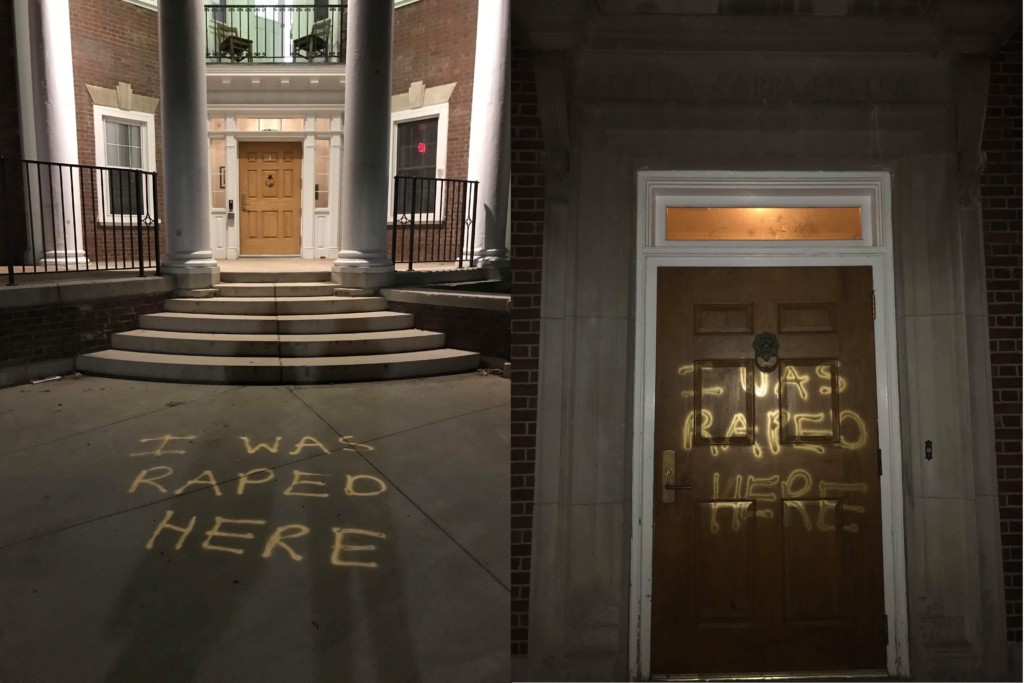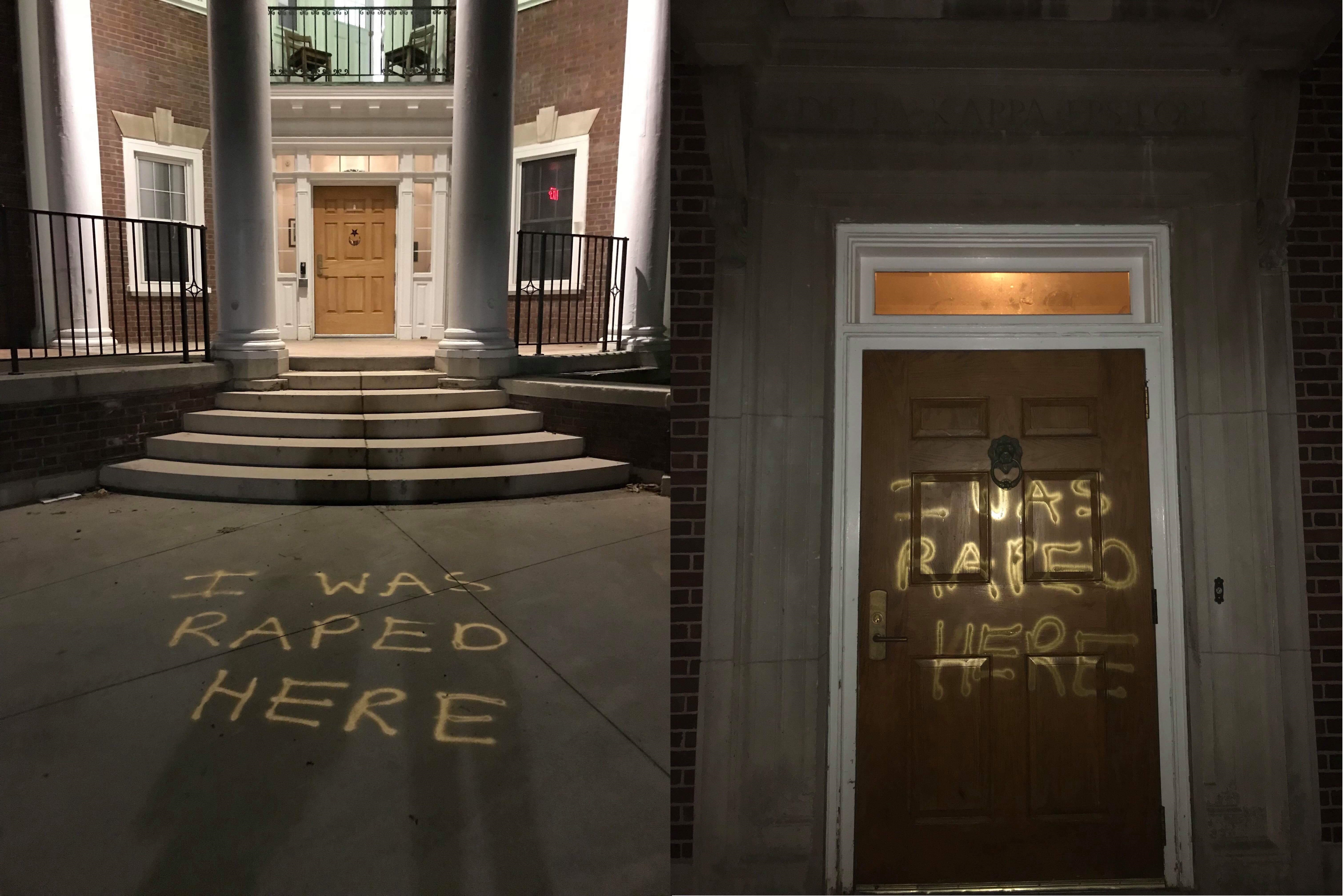Two students spray painted “I Was Raped Here” in front of seven fraternity houses on the Fraternity Quad on the night of June 19 and were made to pay damages by UR.
Two senior women painted the words, which they meant as “a symbol for all of the stories that go unheard to have their moment or even stories that potentially haven’t happened yet.” A third student, a senior man who is a member of the Campus Times staff, played lookout. He was also fined.
Campus Times honored the request to maintain the privacy of the students who partook in the vandalism. In return, the two senior women agreed to disclose why they committed these illegal acts.
“I don’t want this to be misinterpreted as the two of us were assaulted in all seven frat houses,” one of the women said.
However, both students are survivors of their own sexual assaults at Delta Kappa Epsilon and Sigma Chi, respectively.
The students painted the words on the steps or the sidewalks in front of Alpha Delta Phi, Psi Upsilon, Theta Chi, Sigma Alpha Mu, Sigma Chi, and Sigma Phi Epsilon. They vandalized Delta Kappa Epsilon house’s front doors with the same words.
Their goal was to bring awareness to what they consider to be a collective problem.
“I have heard first-hand accounts of people being assaulted at every one of those houses,” the other senior woman said. “And because it’s not about one house, it’s about the system. This crazy flawed system that nobody seems to care to change.”
They both said they expected to get caught. Facial recognition cameras on the Fraternity Quad revealed their identities and Dean of Students Matthew Burns scheduled a meeting with the three students.
“We do have a high tolerance of freedom of expression, but when that crosses the line into criminal activity, I cannot do anything about that,” Dean Burns said.
According to the women, Dean Burns made clear that this incident was felony vandalism with more than $1400 worth of damages. Due to the nature of the vandalism, the Dean said in an interview that he ensured that the individuals were made aware and connected to proper resources. However, they were still collectively fined $750.
In addition, the Campus Times staff member’s involvement has been addressed internally.
Both the women said they previously attempted other ways to bring awareness and prevention to sexual harassment and assault in fraternity houses. They both spoke to fraternity members, some being their close friends, about ways in which they could improve on preventing sexual misconduct in their houses. While they said some brothers were receptive, they claimed others denied that sexual misconduct happened in their houses.
“I have really good friends that are in these organizations that I think are good people, but they have no reason to want to change this because it’s a system that benefits them,” one of the women said.
“They’re not forced to face it, whereas people like me who were traumatized don’t have a choice. I have to look at this and know what goes on. By writing ‘I Was Raped Here’ there’s no way they can ignore it anymore.”
One of the women joined Greek Life in order to implement change from the inside, but claimed the discussions were “vague.”
“When I was in leadership in Greek Life, I would go to these leadership conferences where people are talking in these weird vague terms about the illegal things that go on,” she said.
“If you really want to make things safer, you have to force individuals to have real conversations about what goes on” she continued.“Fraternity and Sorority Affairs does not care to do that because they want to cover themselves and they don’t want people to know that these organizations are doing illegal things because it reflects on them.”
However, Director of Fraternity and Sorority Affairs (FSA) John DiSarro said in an email that he frequently speaks with members about education regarding support, intervention, expectations, and resources for sexual misconduct.
“We partner with SEGway and MOVE to provide sexual violence prevention training to every fraternity and sorority new member; in addition to providing general resources, this program focuses on how fraternities and sororities can promote safety at their social events and within their brotherhood/sisterhood,” DiSarro said. “We work with the Standing Committee on Alcohol Policy and Education (SCAPE) and the Event Registration Committee to implement policies that mitigate the risk for sexual misconduct at social events with alcohol.”
Each semester, DiSarro meets with each fraternity to discuss their event management plan for parties and the policies in place to ensure the safety of students. DiSarro also said that Greek Life and FSA are open to feedback that will help make for a safer campus environment.
The senior women both had suggestions, with one being an open-door policy where all doors to fraternity rooms upstairs could not be shut. If they were to be shut, a SWARM (Students Wanting Alcohol Responsibility Monitored) monitor would need to be informed so they could make sure no other person was in the room as well.
The other suggestion was helping students who may not want to press legal charges or who may mistrust UR’s current system of reporting sexual assault.
The senior suggested having a system where people can share their stories anonymously through a computer. The system would keep track of a person’s record so if two students logged that they had both been sexually assaulted by the same individual, the school would be notified of this.
The seven vandalized fraternities were contacted by Campus Times, with three of them replying with statements.
Theta Chi President and junior Jose Enamorado explained that his fraternity understood that the vandalism was a statement “to raise accountability and awareness of misbehavior among fraternities nationwide” rather than an accusation. In his statement, he expressed that they have had “no recent history of having such a tragic event happen within [their] fraternity.”
Enamorado also recognized the “significant concern” of sexual harassment and assault “for all fraternities; on the quad, off campus and nationwide” and believed accountability needed to be raised.
He also described a sexual misconduct program his fraternity partakes in.
“Members are educated on topics such as binge drinking and learn how to handle a variety of situations in order to minimize the chances of acts like these from occurring; between both brothers and guests,” Enamorado said.
“We also work closely with FSA and Public Safety to ensure we abide by all policies in event planning and hosting. We’ve been complimented by public safety officers themselves on how we manage our events and we believe that is a testament to the safety and security of our home,” he said. Additionally, 5 brothers are professionally trained to assist and protect victims of sexual assault.
Psi Upsilon President and senior John Lisi stated every brother in the Psi Upsilon chapter has completed their fraternity’s Campus Clarity curriculum, another program that focuses on sexual assault prevention.
“We have a zero tolerance policy when it comes to any situation that could possibly be construed as sexual assault of any kind,” Lisi said. “If someone was to report an incident at our fraternity, they would receive the full support of our membership.”
Lisi stressed that through “workshops on risky behavior, mental health issues, and bystander training,” his organization is educated in ensuring the safety of guests at their social events.
Meanwhile, Alpha Delta Phi President and senior Daniel Willis and his organization believed this was not “an effective way to start a dialogue on the issue of sexual assault.”
“We take all instances of alleged sexual assault very seriously and are unaware of any incident that may have instigated the vandalism,” Willis said. “We make it a point to have all of our members educated on the warning signs of sexual assault and harassment, as well as the importance of active consent.”
Willis touched upon how representatives from RESTORE hold educational sessions in their house on sexual harassment and assault and how their fraternity regularly cosponsors the Walk a Mile in Her Shoes event to raise awareness for survivors of sexual violence.
Enamorado, Lisi, and Willis all acknowledged the concern of sexual assault on campus and underscored the importance of SWARM monitors at every one of their social events to aid in preventing sexual misconduct.
“Every brother goes through rigorous training in learning about the effects of alcohol through the SWARM program,” Enamorado said. “Every new member, through FSA, must go through this course when joining a fraternity.”
One of the senior women argued that although there is immense education on sexual misconduct in Greek Life, there are still problems of enforcing policies that prevent sexual misconduct at their social events.
“This doesn’t happen in a controlled environment — everyone’s drunk and everyone’s judgment is compromised,” she said. “I’ve seen some SWARM monitors handing drinks out to underage girls. That’s a good example of something that looks good on paper and looks like we are actually doing something — that is just a front.”
Such alleged actions by SWARM monitors contradict their assigned duties.
Ultimately, both women hope their act of vandalism can serve as a statement to raise awareness and accountability that sexual assault and harassment is not just one individual or house’s fault. They wanted to clarify that their message was not anti-party, but they think the unsafe environment in these houses is a serious concern that is swept under the rug.
“I hope that students on our campus can hear about the story and take a second look at the fraternity life on our campus and question whether or not it’s okay,” one of the women said. “And question whether or not they are involved in the problem themselves.”


